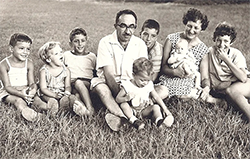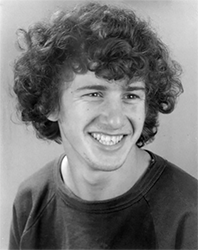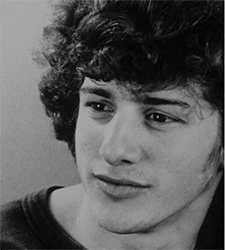Yitzchak Kirshebaum ( Bar Meir) a Holocaust survivor
Yitzchak was born on January 14, 1921 to Ester ( botn in 1896 to Necha and Moshe Yaakov Knoblauch) and Meir Kirschenbaum in the city of Krakow, in the Galicia region of Poland. He was a scion of a line of well-known rabbis on both his father's and his mother's side. Isaac was the eldest of three children His sister Necha Sara was born in 1928 and his brother Shmuel Mordechai was born in 1932 . His father was a wealthy merchant and his mother a housewife. The way of life in the family was very religious. Yitzchak's father was a "devout" and accordingly he was educated at home. At the age of 4, Yitzchak went to a "room". At the age of five, he already learned "Khums". At the age of 6 he studied the interpretation of Rashi, and at the age of 7 he began to study "Gemara". At home the emphasis was on studies and in his free time Yitzchak's father would sit and study. On Shabbat Yitzchak's father would test him to see if he knew well what he studied that week.
From the age of 7 to 11, he also studied during the week (secular studies) in the afternoon, and from the age of 11, instead of studying in the afternoon, his father hired a private tutor every year, two months before the end of school, who taught Yitzchak for about two hours a day. At the end of the year, Yitzhak also passed the external exams (of the Polish schools). From the age of 14-17 he studied in yeshiva and midrash schools. And at the age of 17 he left the yeshiva, studied for a year in a Polish gymnasium and passed the matriculation exams. After his studies, he was accepted to study mathematics at a university in Switzerland, but then World War II broke out, and with the German invasion of Poland, all his plans for higher education were terminated.
The Germans entered Krakow about 10 days after the outbreak of the war and occupied it. Yitzhak, whose apartment in the Kazimierz district overlooked the Vistula River, remembered the image of the German tanks crossing the bridge over the river. Immediately with the German occupation, decrees began against the Jews. It was allowed to rob the Jews, confiscate their property and harm them. After that, the Germans began to force the Jews to wear the yellow patch, and later, took people to forced labor; First - in Krakow, and then also outside the city. The livelihood was not available and my father's family began to sell their property to get money for living.
More about fro
fro
From the age of 7 to 11, he also studied during the week (regular studies) in the afternoon, and from the age of 11, instead of studying in the afternoon, his father hired a private tutor every year, two months before the end of school, who taught Yitzchak for about two hours a day. At the end of the year, Yitzhak also passed the external exams (of the Polish schools). From the age of 14-17 he studied in yeshiva and midrash schools. And at the age of 17 he left the yeshiva, studied for a year in a Polish gymnasium and passed the matriculation exams. After his studies, he was accepted to study mathematics at a university in Switzerland, but then World War II broke out, and with the German invasion of Poland, all his plans for higher education were terminated.
The Germans entered Krakow about 10 days after the outbreak of the war and occupied it. Yitzhak, whose apartment in the Kazimierz district overlooked the Vistula River, remembered the image of the German tanks crossing the bridge over the river. Immediately with the German occupation, decrees began against the Jews. It was allowed to rob the Jews, confiscate their property and harm them. After that, the Germans began to force the Jews to wear the yellow patch, and later, took people to forced labor; First - in Krakow, and then also outside the city. The livelihood was not available and my father's family began to sell their property to get money for living.
More about fro
fro
From the age of 7 to 11, he also studied during the week (regular studies) in the afternoon, and from the age of 11, instead of studying in the afternoon, his father hired a private tutor every year, two months before the end of school, who taught Yitzchak for about two hours a day. At the end of the year, Yitzhak also passed the external exams (of the Polish schools). From the age of 14-17 he studied in yeshiva and midrash schools. And at the age of 17 he left the yeshiva, studied for a year in a Polish gymnasium and passed the matriculation exams. After his studies, he was accepted to study mathematics at a university in Switzerland, but then World War II broke out, and with the German invasion of Poland, all his plans for higher education were terminated.
The Germans entered Krakow about 10 days after the outbreak of the war and occupied it. Yitzhak, whose apartment in the Kazimierz district overlooked the Vistula River, remembered the image of the German tanks crossing the bridge over the river. Immediately with the German occupation, decrees began against the Jews. It was allowed to rob the Jews, confiscate their property and harm them. After that, the Germans began to force the Jews to wear the yellow patch, and later, took people to forced labor; First - in Krakow, and then also outside the city. The livelihood was not available and my father's family began to sell their property to get money for living.
More about fro
fro
The Germans closed the schools and it was forbidden to study and teach. At night there was a curfew, and it was forbidden to break it. Social life was concentrated inside the houses with all the neighbors gathered in one apartment. The radios were confiscated by the Germans and the Jews knew about what was happening outside their area of residence only from rumours, which were usually not particularly verified. At this point, my father's family no longer had enough money to join Oskar Schindler's list, so the family was sent to work in another town. After several months, Yitzchak and his father were separated from his mother and his two younger siblings, Shmuel and Sarah, who were sent to the death camps together with their mother. After about a year, Yitzhak and his father returned to Krakow, where in the meantime the Jews were concentrated in the ghetto. His father had a work permit but Isaac did not, and he had to hide in the attic. In the attic he found several boxes of books which provided him with employment for an entire winter (1941) and thus he read and studied by himself. In 1942, with the dissolution of the Krakow ghetto, Yitzhak and his father were also forced to leave.
During the dismantling of the Krakow ghetto, as is known from the movie "Schindler's List", the ghetto commander, Eamon Gett, stood and ordered the Jews to turn right or left. Those who were turned to the right were sent to work and those who were turned to the left - to death. Yitzhak, who lacked documents in the ghetto, and therefore if he had been caught would have been sent to death, realized that he had to act. With great Jewish insolence he approached the commander of the ghetto, and angrily told him: "I don't understand why no one tells me what I should do here!". Get, who was surprised, sent him to work. Isaac's troubles did not end here. He was sent to several labor camps, and at the end of the war he was released from a labor camp in Germany, next to the town of Leonberg. Towards the end of the war, the Germans put them on a train that traveled east, until the German and Ukrainian guards escaped from it, and the prisoners were released by the Americans, in extremely poor physical condition. The Americans petitioned the survivors for abundant and rich food, and many of them, who devoured this food, died as a result of the imbalance between their previous state and their current state. Yitzhak had appendicitis (appendicitis), and needed urgent surgery. Since no American doctor could be found, the Americans took a captured German surgeon, who successfully operated on Isaac with a gun pointed at his temple.
After his release, my father joined a training group that was destined to go to Kibbutz Afikim, and stayed in a training camp in Germany. The group went to Israel on the "Letron" ship, but he stayed with his wife, Leah, who had a heart condition and could not join the voyage. They immigrated to Israel with a fake passport on the Kedma ship in 1946. and arrived at Kibbutz Afikim. After a short time, Leah died of heart disease.

In 1950, he met my grandmother (Hiya Pfiperberg), who was one of the founders of Kibbutz Kfar Hanasi, and came to Efikim as a "foreign worker". They were married a few weeks later, in May 1950, during the austerity period in Israel. Seven children were born to them and they were reaised in Afikim.
From right Esther.
Mother Chaia holding baby Chana, Yosh (Yehoshua) father Yizhak holding Israel. Yosi, Mili and Micha.
Yitzchak, who worked in agriculture, and later as an air conditioning and refrigeration technician, was an autodidact. Until his last day, he continued to study mathematics, physics and Judaism at the highest level on his own, and helped many members of the household who needed these subjects for their university studies. In the last months of his life, he even returned to his Latin studies, and began to translate the New Testament from Latin to Hebrew.
?
???? ?? ???? ?
With the wife and his seven children
He had an extraordinary sense of humor, and his platoons and humorous review articles made him a name in the kibbutz bulletin. Yitzhak died on June 8, 1996 at the end of Shavuot and he is 75 years old.Son Yosi was killed as a soldier in the Israeli army.
 S9n Yosi
S9n Yosi

??????
?
???? ????? ?"?
Yitzhak died on June 8, 1996 at the end of Shavuot and he is 75 years old.


